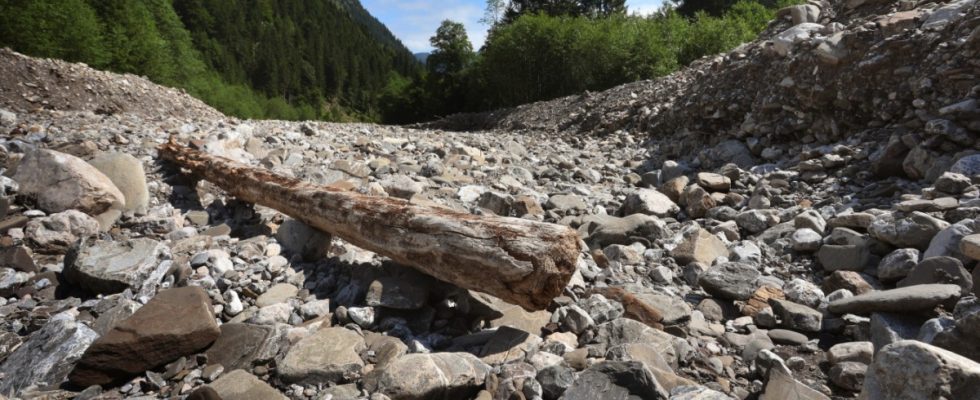In the end, those involved should put everything back to square one: The Rappenalpbach will be rehabilitated and returned to the state it was in before it was destroyed in autumn 2022. This is the result of a settlement that Älpler and the Free State concluded on Monday before the Augsburg Administrative Court. This at least explains how one of the greatest crimes against nature in Bavaria in recent years can be eliminated. Both parties stressed that they wanted to avoid a long court battle during which nothing happened in the largely destroyed Rappenalpbach valley. However, the alpine people as plaintiffs and the authorities as defendants also emphasized that the views continued to differ diametrically as far as responsibility for the momentous straightening of the riverbed last autumn was concerned.
“We hide the question of guilt in our proceedings,” said the judge. “It’s all about how to best do justice to nature and water bodies.” However, the court then gave an insight into how, from its point of view, it was possible for the alpine farmers to dredge and straighten the stream in the strictly protected natural jewel. From the point of view of the court, the starting point of the dilemma was that none of the parties involved was evidently aware that the market town of Oberstdorf was responsible for the maintenance of the stream. After damage caused by heavy rain, the alpine farmers saw themselves as responsible and spoke to the lower nature conservation authority. After an on-site visit, it was like it often is, according to the judge: “Two people, two completely different reports about the process.”
The alpine people referred to a note in the file after the on-site visit and straightened the creek in disregard of all nature and water protection requirements. “Well meant is not well done,” said the judge. At the same time, she found that mistakes had been made on both sides: If the responsible employee in the Oberallgäu district office had forwarded the case to the water supervisory authority, they would probably have intervened. “However, it is difficult to squeeze all of this into legal categories, so it makes more sense to look ahead.”
The settlement now provides for the Free State to draw up a concept at its own expense as to how the Rappenalpbachtal can be restored to the state it was in before the dredging work last year. Environment Minister Thorsten Faithr (Free Voters) had promised that the torrent would regain its original dynamic. The alpine people, in turn, are responsible for the initial construction measures, for example they should set armourstones to prevent the river bed from deepening further. Measurements and monitoring are then agreed.
The Ministry of the Environment welcomed the comparison. “Now you can act in the interest of the Rappenalpbach,” said a spokesman, “you don’t have to wait for the outcome of a long court case.” It is now important that the work “starts quickly and is closely monitored by nature conservation experts”. The chairwoman of the environmental committee in the state parliament and Green politician Rosi Steinberger also called the comparison good. “The Rappenalpbach must become a natural torrent again,” she said. “The Ministry of the Environment and above all Minister Thorsten Faithr must keep an eye on all measures and approve them. Under no circumstances should the renovation be based on a savings version.”
“We will not accept a minimal solution,” says the Bund Naturschutz
The Bund Naturschutz (BN) also approves of the desired renaturation, but wants to examine the Free State’s concept closely. “We will not accept a minimum solution,” said Thomas Frey on the sidelines of the negotiation. In comparison, however, the BN regional officer for Swabia lacks compensation for the damage caused to the river. The river bed was so massively destroyed that the water regularly seeps underground and the mountain stream runs dry. The BN suggests, for example, expanding the river to its historical terrain edges and thus giving it more space again.
Irrespective of the settlement, the criminal investigations by the Kempten public prosecutor’s office into a violation of German and European nature conservation law by the Alpine farmers are continuing. “It is fundamentally the case that a violation of the law cannot be repaired by such a settlement,” said a spokesman for the public prosecutor’s office on Monday. Should the investigations actually result in a violation of the law, the comparison could at most be taken into account in the later sentencing. In the case of environmental crimes, the perpetrators face fines of up to 50,000 euros and even prison sentences of up to ten years, depending on the severity. However, it is not yet clear how the investigations against the Alpine cooperative will turn out. In the spring, the public prosecutor’s office commissioned a comprehensive report on the damage to flora and fauna in the nature reserve. The recordings for this are ongoing.

